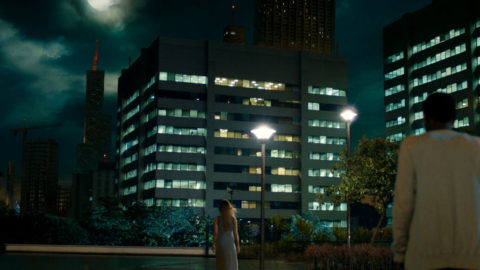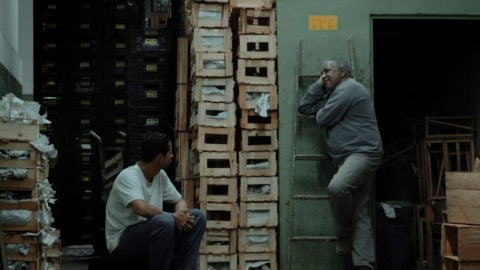Film of the Week: Araby
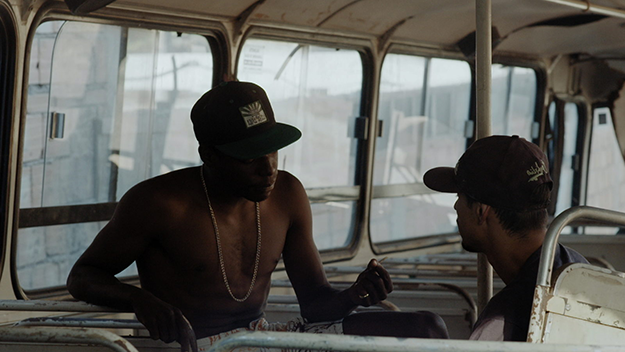
Araby (original title: Arábia) is no more set in Arabia than Liverpool is set in Liverpool or Brazil in Brazil; it is, however, set in Brazil. In its opening moments, this second feature by João Dumans and Affonso Uchoa (The Hidden Tiger, 2014) could fool you into thinking that we’re somewhere in the U.S.: the camera follows a teenage boy as he cycles along a winding road to the sound of Texan songwriter Townes Van Zandt’s late ’60s ballad “I’ll Be Here in the Morning,” a classic expression of the tension between love and wanderlust: “There’s lots of things along the road I’d dearly like to see.” The boy on the bike will see plenty of things and plenty of roads, but it will be through someone else’s eyes: Araby will turn out to be another person’s story altogether, and the roads it travels will be winding and discontinuous.
If, 15 minutes into Araby, you aren’t persuaded that you’re going to see anything remarkable, bide your time: the film seems deliberately to start in an unspectacular register, by way of a slow-burning setup. The measure of the film’s audacity is that it seems to start so very unaudaciously. The boy, André (Murilo Caliari), lives in the industrial town of Ouro Preto, in the state of Minas Gerais in southeastern Brazil. He has a young brother with health issues; their parents are away but their aunt, a health worker, looks in on them. We see her visiting an elderly woman in town; we also briefly meet a worker in the nearby factory, one Cristiano (Aristides de Sousa). Nothing much of interest seems likely to happen, and Araby initially seems becalmed in generically ruminative art-realism ennui: one of the most striking images in this opening section is of André scraping a finger of dust off a window sill.
Then, following a workplace accident, we learn that Cristiano has died. André, sent to pick up his belongings, starts reading the dead man’s notebook, in which he tells the story of his life. “It’s hard to choose something to tell,” says Cristiano in voiceover. “Because in the end all we have is what we remember.” At 22 minutes in, the film’s title flashes up, and the story proper begins.
I say “the story proper,” but the fascination of Araby is that it doesn’t tell a proper story—not in the sense of a linear narrative in which the most important events are given due weight and things form a coherent pattern of cause and effect. Cristiano’s saga is more like life: patchy, fragmented, full of gaps and broken connections, as much about the things that he omits, or forgets, to tell us as about those he reveals. It begins with him as a young man at a loose end in the small town of Contagem; we see him talking in a bus with a friend, presumably the one with whom he plans to steal a car. Cut abruptly to a shot of Cristiano sitting glumly at the foot of a wall in prison orange overalls. “I spent a year, four months, and 26 days in jail,” he tells us.
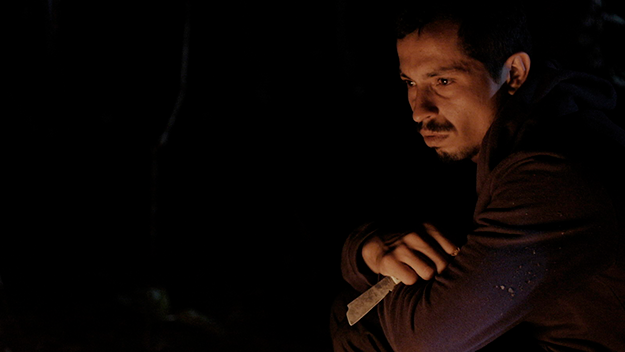
Araby is full of such leaps; of narrative threads that promise to lead somewhere only to be promptly severed; of characters introduced only to vanish, never to be seen again. There’s one story Cristiano wants to tell, about a woman named Ana. But to do that, he says, he first has to take us back to the moment he left jail. After a few shots of him walking down a highway, we meet an elderly man on whom the camera holds at length, as if to signal that he’s going to be significant. His name, we hear, is Ze, or Barreto. Indeed he will be significant—but this is the only time we see him. Cristiano starts work on a tangerine farm, and learns how things work there, a lesson that sums up his insight into the working life: “We sow so much, but reap so little.” Soon after, we hear that Barreto has died, that he was a strike organizer, that “the land liked him.” Cristiano, learning that no one on the farm is getting paid, confronts his boss, presumably inspired by Barreto’s example—then takes off, unpaid but with a stock of tangerines to sell for himself. In voiceover he comments, “Even now, in Ouro Preto, I remember Barreto’s story.”
We move on with Cristiano. He gets a job in construction, working on a motorway along with his friend Nato. Time keeps slipping by: “Nato and I were on the road almost three years,” Cristiano says, updating on us on all the jobs he’s done in that period; we watch an extended shot of landscape rolling by. Other parts of his life are hinted at in shorthand: shots of women, presumably prostitutes, one framed in silhouette in deep red, another leaning on a balcony, a couple asleep in bed. We never learn who they are. Maybe Cristiano never knew their names, maybe he’s forgotten.
Then something happens—a sudden event that is absolutely startling and that, in any conventional narrative, would not only stand at the dead center of things but also entirely change our idea of the kind of man Cristiano is. Instead, it merely inflects our understanding of him. What he does, he does in an instinct of survival, and when he effectively forgets the incident—at least, puts it behind him, never mentioning it again—we also understand that a man like him, working in those economic conditions, has to move on. Later, Cristiano and an older co-worker, one Antonio Carlos, have an amusing discussion about what materials are most and least burdensome to carry: cement, salt, fish pellets, a live pig… The heaviest, we begin to realize, is surely memory itself, but Cristiano seems to be adept at packing it away so that it’s as lightweight as possible, a manageable weight for the road—like the memory of Antonio Carlos, who we’re told died shortly after, but who clearly left a trace in Cristiano’s life.
Cristiano gets a job in a textile factory and meets Ana (Renata Cabral), who works in the office there: they form a close enough bond that she remains a central presence for a whole sequence. To quote Van Zandt’s song, she’s the woman to whom Cristiano is at last prepared to say, “Close your eyes, I’ll be here for a while.” But it only is for a while, and by force of circumstance, he moves on again—eventually getting a job at the factory in Ouro Preto. There he starts keeping his notebook and, closing the circle, meets André and speculates on the boy’s isolation.
Araby is at once a highly concrete piece of realism—a study of the life of one migrant worker, chosen as if at random out of multitudes—and deeply poetic. The realism comes from the docudrama attention to all the working-class nonprofessional players encountered along the way, and from the unobtrusively compelling central presence of Aristides de Sousa. He’s usually undemonstrative to the point of seeming an absence—just the observing consciousness in front of which all these events roll by—but once in a while he gets to emote more effusively, as in the scene where Cristiano entertains his workmates with a lively rap to acoustic guitar, a little hard-times story within the story.
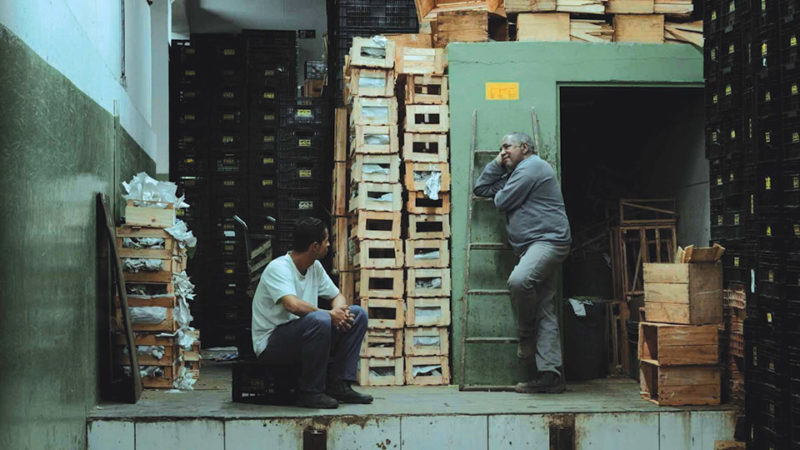
The poetry partly comes from the style, and from certain heightened images—notably an intermittent series of chiaroscuro still-life shots, like a crumpled plastic water bottle against the hanging sleeve of a blue work jacket. It also comes from the tender, wistful music: along with the Van Zandt, heard twice, selections from Brazilian artists Maria Bethania and Renato Teixeira, as well as, more unexpectedly, Tunisian oud player Anouar Brahem. What consolidates this overall poetry is an ending all the more arresting because it drops into a register of minor-key stillness. Cristiano finally muses on what he’s learned on his travels, his voice framed for the first time against absolute silence, and I can’t think when I last heard silence used so beautifully and decisively in a film.
Araby may seem at first sight to be as uncooked a slice of life as realist cinema ever offers, but the conception is both epic—in the Odyssey sense—and literary. Interviewed for Film Comment last year by Nicholas Elliott, Dumans and Uchoa said that they wrote the film for de Sousa, imagining another existence he might have led: “We wanted to see his life as the life of a character in a Joseph Conrad or John Dos Passos novel.” Other writers who come to mind, given the nomadic theme, are Jack Kerouac and the Chilean writer Roberto Bolaño, whose narratives often drift waywardly across vast land masses (André also has a book by Argentinian writer Julio Cortázar on his bedside table, although there’s little of his uncanny fabulism here).
As for the title Araby, it comes from a short story in James Joyce’s Dubliners, which the filmmakers at once point considered adapting. In the context of the film, the title refers to the punchline of a joke told by one of Cristiano’s colleagues on the motorway team. It’s a throwaway moment, yet highly significant, as the joke is about work, but also about cement, about the weight of things, the daunting challenge of life’s tasks. Araby may not seem to tell much of a story, in the usual sense: it seems to be one damn thing after another, but that, the film persuasively demonstrates, is precisely what life is. It’s just that those things may have invisible threads running between them, and hanging from those threads, the weight of a knowledge that you wouldn’t believe one life could carry.
Araby opens exclusively at the Film Society of Lincoln Center on June 22.
Jonathan Romney is a contributing editor to Film Comment and writes its Film of the Week column. He is a member of the London Film Critics Circle.




